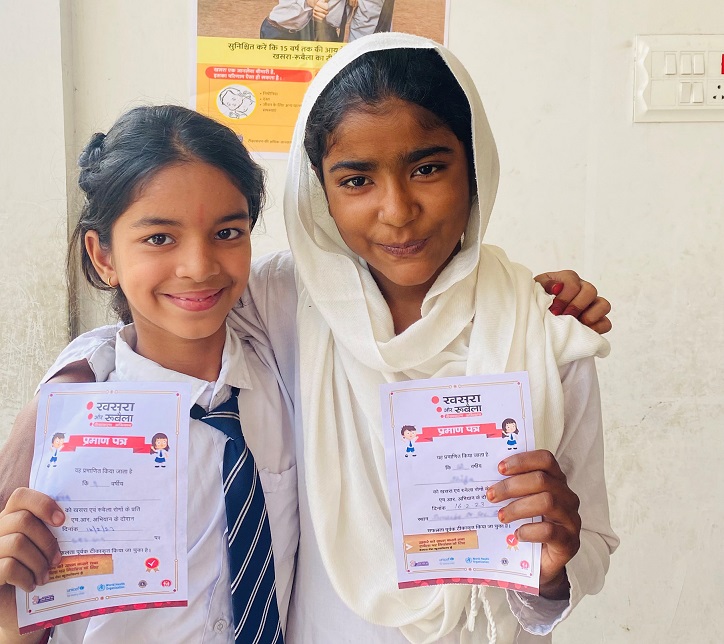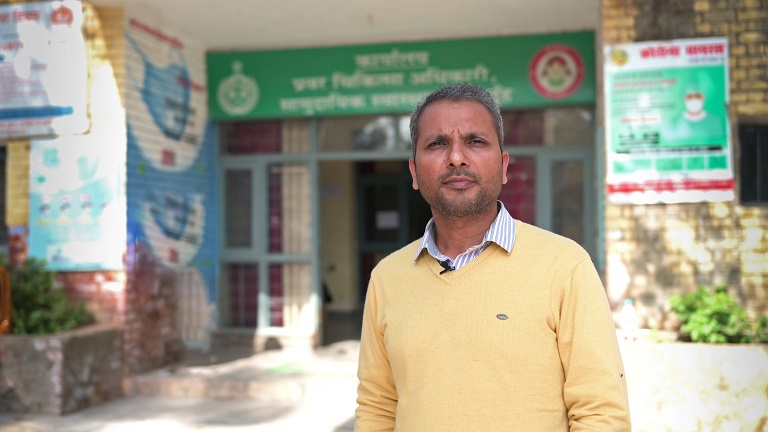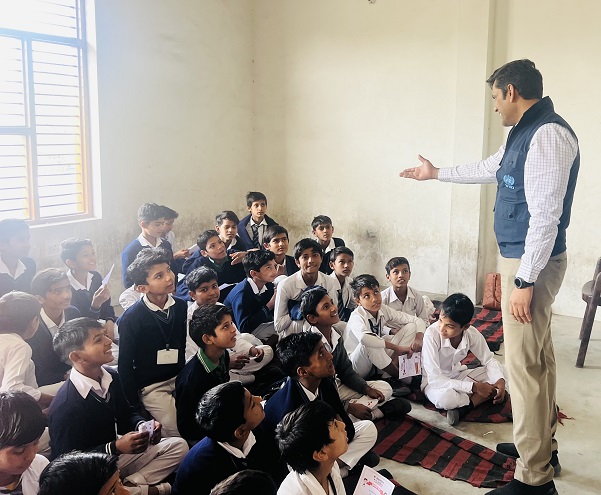MEWAT, HARYANA: We all know that friends make the world go round. But did you know that it’s also a key ingredient of a successful vaccination campaign? Ms Priya Singh and Ms Shifa Ali are besties holding hands as they queued up to get through the measles and rubella (MR) vaccination catch-up campaign organised in their school in Mewat, Nuh district in the state of Haryana on 16 February 2023.
Ms Ali and Ms Singh, Class IV students at the Sunrise Public School, were a little apprehensive about getting vaccinated as the day before as the school grapevine reported that it was a “painful business”. However, their parents and grandparents packed them off to school with the assurance that all will be well. Their school principal, teachers and district health officers/workers also said they would not feel a thing. That indeed was the case, as was apparent from the smile that lit up their eyes post vaccination. The duo promptly turned avid campaigners, reassuring their friends waiting for their turn to get vaccinated. Interestingly, Shifa, an Urdu word means health — Ms Ali is indeed living up to her name.

Ms Priya Singh and Ms Shifa Ali hold up their vaccination cards after getting the measles and rubella (MR) vaccine during the MR vaccination catch-up campaign organised in their school in Mewat, Nuh district of Haryana. (Photo credit: Rina Sinha / © WHO India)
Measles is a highly contagious viral disease and a leading cause of death among vaccine preventable disease. Rubella causes congenital birth defects. Both are preventable through vaccination. Between 2000–2020, measles vaccination is estimated to have averted over 29 million deaths globally, a drop of 83%, which makes it one of the best buys in public health. However, in areas where coverage is low, measles spreads rapidly and hits hardest in settings of inequity. During the MR campaign in Haryana, children aged 9 months to 15 years, are being given an additional dose of the vaccine regardless of previous vaccination history or illness. Over 344 million children have been vaccinated between 2017 and February 2023 through wide-age range MR vaccination campaigns.
Disease elimination requires more than a business-as-usual approach.
India is targeting a vaccination coverage of 95% with two doses of MR vaccine to achieve elimination. Learnings from previous public health successes such as polio, are being successfully applied to measles elimination. These encompass sensitive surveillance, a robust lab network, timely response to outbreaks, monitoring of progress and community engagement. Cases of fever and rash are being tracked, investigated and samples tested.
Dr Naveen Yadav, District Immunization Officer, Nuh, Haryana, said, “Health Department Nuh and WHO have worked together with other stakeholders towards planning, intersectoral coordination and capacity building of various stakeholders to roll-out this campaign successfully in the district. In this as well as other immunization campaigns, we have always kept the community at the front and centre. Collaborations with other departments, partner agencies, NGOs and the community are helping bridge gaps.”

Dr Naveen Yadav, District Immunization Officer, is responsible for the immunization programme management in Nuh district of Haryana. (Photo credit: Rajiv Solanki / © WHO India)
Mewat has been the karmabhumi (a person’s place of work or service) of Dr Rajnikant, Urban Nodal Officer for Immunization, and a veteran of India’s polio campaign who given his extensive experience of working with the community feels, “Sharing information, engaging communities and local influencers help address vaccine hesitancy, counter misinformation and cultural myths around measles, as is evident from the success of the recent round of catch-up campaigns.”

Dr Puneet Mishra from WHO’s National Public Health Support Network speaks to students in the monitoring room post vaccination. (Photo credit: Dr Nivedita Vasudeva / © WHO India)
WHO’s National Public Health Support Network (NPSN) supports the Government of India in establishing, sustaining, and strengthening MR surveillance, immunization, outbreak identification, public health response and laboratory network, which are critical for elimination.
Measles is also a “tracer” of the strength of the immunization system and an indicator of universal health coverage. India has shown strong commitment towards achieving MR elimination and the vaccine is given free under India’s Universal Immunization Programme.
As states go all out to achieve their vaccination goals using new age campaign strategies, which often lend these occasions a celebratory vibe. Efforts to protect the health of children is finding increasing support from children.
